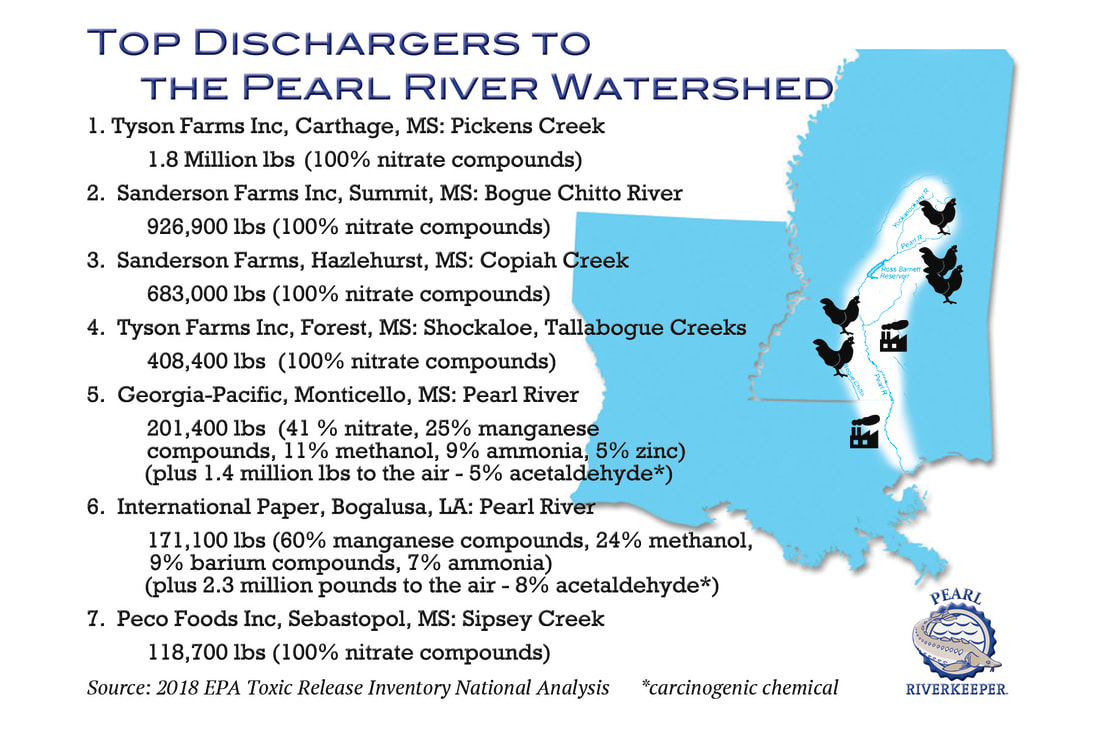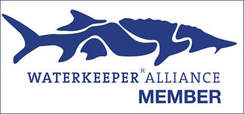|
According to EPA's most recent Toxic Release inventory (TRI) National Analysis, over 4 million pounds of toxic chemicals were dumped into the Pearl River in 2018. The vast majority of this toxic waste came in the form of nitrates from 3 poultry processing companies, Tyson Foods, Sanderson Farms and Peco Foods.
Nitrate pollution has numerous "external costs" to the environment which are not paid for by the companies discharging this toxic waste. These external costs, borne by the taxpayer and the public in general, include:
In addition to the nitrate compounds dumped by the poultry processing industry, Georgia-Pacific and International Paper together contributed 372,500 pounds of toxic discharges to our watershed, including manganese compounds, methanol, nitrate compounds, ammonia, barium compounds and zinc. In addition to discharges to water, Georgia-Pacific paper mill in Monticello, MS also released 1.4 million pounds of toxic chemicals to the air, including the carcinogenic chemical acetaldehyde. International Paper in Bogalusa, LA released 2.3 million pounds of toxic chemicals to the air. This Pearl River Basin chemical discharge data was compiled from the EPA's 2018 Toxic Release Inventory (TRI) National Analysis Report of chemical discharges to air, land and water. "The TRI tracks the management of certain toxic chemicals that may pose a threat to human health and the environment. Certain industrial facilities in the US must report annually how much of each chemical is recycled, combusted for energy recovery, treated for destruction, and disposed of or otherwise released on- and off-site." The discharge of these chemicals is legally authorized by each state through the National Pollution Discharge Elimination System. Mississippi and Louisiana Departments of Environmental Quality test their waterways, designate the waterway sections as "attaining their designated use" or as "impaired" and make Total Maximum Daily Load (TMDL) discharge determinations. The TMDL is then used as the basis for discharge permit authorizations.
"Since the creation of the TRI Program, the information collected and presented has provided a way for citizens to better understand possible sources of pollution in their communities. This better understanding can be the basis for actions, such as communications with facilities releasing chemicals to the environment and with regulatory authorities that have oversight responsibilities. This concept of citizen empowerment is summed up by the slogan, 'A Right to Know, A Basis to Act'." EPA.gov. Louisiana ranks 4th out of 56 states/territories nationwide based on total releases per square mile (rank 1 = highest releases). Mississippi ranks 13th out of 56. The TRI is easily searchable by state, county, city or zip code: https://www.epa.gov/trinationalanalysis/where-you-live. Join forces with Pearl Riverkeeper to help protect our watershed by signing up for our newsletter, becoming a member or volunteering for our Clean Water Team. Pearl Riverkeeper conducted an analysis on the 2018 Toxic Release Inventory National Analysis Report database published by the EPA. Errors are possible. Please consult the EPA website for the full report. Comments are closed.
|
AuthorPearl Riverkeeper is a licensed member of the Waterkeeper Alliance, the largest and fastest growing nonprofit solely focused on clean water. Archives
July 2024
Categories |
|
Ready to support our work for Clean Water and Healthy Rivers?
|
|


 RSS Feed
RSS Feed
